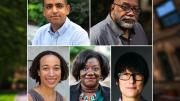Five Harvardians have been named fellows by the MacArthur Foundation this year. Commonly referred to as the “genius” grant, the fellowship recognizes recipients’ “extraordinary originality and dedication in their creative pursuits” and their “marked capacity for self-direction.” The $625,000 no-strings-attached award is meant as an investment in the future promise of the fellows’ work.
The Harvard-affiliated recipients are:
- Isaiah Andrews, professor of economics and a research associate at the National Bureau of Economic Research. An econometrician, Andrews focuses on statistical inference, a process of deducing the properties and characteristics of a population based on sample data. In particular, Andrews works to identify reliable and broadly applicable methods for studying major challenges in economics, social science, and medicine, especially methods that can overcome common problems found in applied empirical approaches. He has studied publication bias in economics and other disciplines, methods for conveying scientific information to decisionmakers, and the issue of weak identification in macroeconomic models.
- Fred Moten ’84, a cultural theorist and poet who writes on visual culture, poetics, music, and performance. His work “seeks to move beyond normative categories of analysis, grounded in Western philosophical traditions, that do not account for the Black experience,” the MacArthur announcement read. He is developing “a new mode of aesthetic inquiry wherein the conditions of being Black play a central role.” His diverse body of work includes In the Break: The Aesthetics of the Black Radical Tradition (2003), eight collections of poetry, and a three-volume theoretical treatise of essays written during a period of 15 years, consent not to be a single being (2017-2018). He is a professor of performance studies at New York University.
- Monika Schleier-Smith, ’05, an experimental physicist at Stanford University who studies the behavior of many-particle quantum systems. Her work stands at the interface between quantum information science and atomic, molecular, and optical physics, with the goal of “harnessing the properties of quantum systems” for powerful new computing paradigms, ultra-precise sensors, and other applications. The experiments she devises involve laser-cooled atoms that allow her to isolate and manipulate physical phenomena that were previously inaccessible. Her studies of quantum entanglement—a fragile phenomenon that occurs when particles interact and their behavior becomes correlated—have led to a deeper understanding of entanglement itself and improvements to atomic clocks beyond the standard limits of precision. In addition, she “has demonstrated an effective method for engineering controllable, long-range interactions within a cloud of thousands of atoms by sending information back and forth between distant atoms via photons.”
- Two faculty associates of the Berkman Klein Center for Internet and Society also received fellowships: Tressie McMillan Cottom, a sociologist who studies the confluence of race, gender, education, and digital technology and whose 2017 book, Lower Ed: The Troubling Rise of For-Profit Colleges in the New Economy, examined for-profit institutions and rising inequality; and Mary L. Gray, an anthropologist and media scholar who investigates the way labor, identity, and human rights are transformed in the digital economy and whose 2019 book, Ghost Work: How to Stop Silicon Valley from Building a New Global Underclass, revealed the human labor behind seemingly automated systems.









